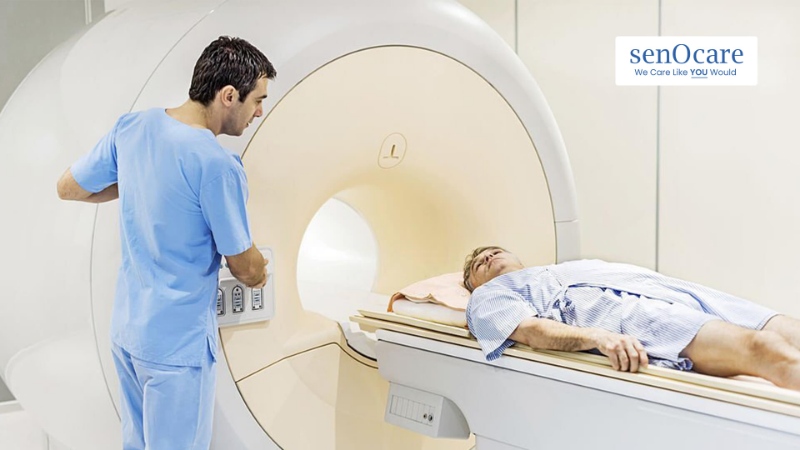Senior Citizen Health Checkup: Why It Matters
Regular health checkups are important. Why? Because major diseases, including critical illnesses, often go unnoticed until their symptoms become unbearable. A health checkup often indicates impending diseases. Complete Blood Count (CBC), for instance, can indicate any abnormality in the count of Red Blood Cells, white blood cells, platelets, etc. which are usually signs of infections. Further, follow up with deeper diagnosis and treatment can help alleviate discomforting symptoms, and make living better and enjoyable. Major Problems Do Senior Citizens Experience

Though health checkups are equally important for all age groups, senior citizen health checkups are more critical. Senior citizens (60+ years) tend to have lower immunity than younger people, so their ability to fight common infections such as cold, flu, etc. is lower1. Slightest of abnormalities in their body vitals may lead to discomforting symptoms and make doing simple daily chores like walking uneasy. A regular full body checkup for senior citizens can detect signs of abnormalities. So, caregivers can take preventive actions.
Not to mention, the senior citizens with chronic conditions such as diabetes, hypertension, Chronic Obstructive Pulmonary Disease (COPD, etc. Results of regular health checkups often indicate changes in chronic conditions like diabetes and can help them manage the symptoms better or prevent from exacerbating the existing conditions.
What checks should you perform?
Full body Checkups for Senior Citizens
Full body checkups for senior citizens include a range of body tests, including -
1. Complete Blood Count (CBC)
This test counts the number of Red Blood Cells, White Blood Cells, Platelets, Hemoglobin, and other components of the blood in senior citizens. ESR, MCH, MPV, MCV, Differential Count, etc. are also performed as part of the test. Any abnormalities found in CBC often indicate infection.
2. Complete Metabolism Panel (CMP)
This test is often recommended for senior citizens with kidney and liver problems. It checks the levels of Calcium, Albumin, Bilirubin, Aspartate Aminotransferase (AST), Alanine Aminotransferase (ALT), etc. Abnormal levels of these substances in the blood often indicate problems with kidney and liver. CMP is often recommended for senior citizens with chronic kidney disease (CKD).
3. Lipid Profile
Lipid profile is a part of most full body checkups for senior citizens. It checks the level of -
- Total cholesterol
- Triglycerides
- Low-density Lipoprotein (LDL/ bad cholesterol)
- High-density Lipoprotein (HDL/ good cholesterol)
- HDL ratio
Abnormal levels of LDL in the blood indicate increased risk of heart diseases and stroke. Senior citizens with chronic heart disease should often take the lipid profile test. So, they can manage Understanding the level of different cholesterols can helps prevent heart stroke and other heart diseases among senior citizens.
4.
Blood Sugar
This test checks the level of glucose in the blood. Higher level of glucose (hyperglycemia) indicates diabetes. Similarly, lower level of glucose (hypoglycemia) indicates overdose of diabetes managing medication. The test checks-
- Fasting blood sugar (level of glucose on an empty stomach)
- PP Blood Sugar
- HbA1c
Diabetes is a common chronic disease among senior citizens of India. Regular monitoring of glucose levels can help diabetic people manage their glucose levels and reduce the risk of diseases such as diabetic retinopathy (blindness), stroke, heart attack, kidney failure, etc.2
5. Renal Profile
As people grow older their kidney undergoes anatomical and physiological changes3, which affects it function. Older adults often experience problems due to changes in their kidney function. If it goes unnoticed or undiagnosed, chances are it might result in kidney problems.
Renal profile Tests indicate changes in the kidney function. Major sub tests of the renal profile are:
- Urea
-Creatinine
-Uric Acid
These tests are performed on the urine sample collected from older adults. Abnormal levels of the above substances often indicate problems in kidney. Renal profiles tests are likely to be a part of the best senior citizen health checkup packages.
Benefits of Senior Citizen Health Checkups

Apart from a sense of relief, health checkups offer several benefits for senior citizens and their caregivers, including -
Better management of chronic conditions
Chronic conditions like diabetes, hypertension, etc. can wreak havoc on health if not managed well. Health checkups can show signs of impending health issues. So, chronic conditions can be managed better. This also helps in reducing the risk of health emergency, hospitalization, etc.
Caregivers are better equipped to support elders
Health checkups for senior citizens also gives peace of mind for caregivers as they stay informed about the conditions of the elders. In case of abnormal results, caregivers can prepare themselves better to support the older elders.
Caregivers can also work better, towards reducing the risk of fatal injuries in the light of health checkup results.
Live more comfortably
Health checkups can show signs of impending physiological problems. So, caregivers can take appropriate doctor consultations and avoid health problems. This can help senior citizens live their retirement life more comfortably.
How does Senocare help?
As people age, their health tends to deteriorate. Senior citizens, especially the ones with chronic conditions, are at increased risk of catching infections and further complicating their health conditions.Regular health checkups help mitigate the risk of health complications by highlighting abnormalities in physiology. So, proper doctor consultations can be taken.
Senocare offers a range of senior citizen health checkup packages. Additionally, it offers care services that help them live their life more comfortably.
References:
1. https://www.ncbi.nlm.nih.gov/pmc/articles/PMC5291468/
2. https://www.who.int/india/health-topics/mobile-technology-for-preventing-ncds